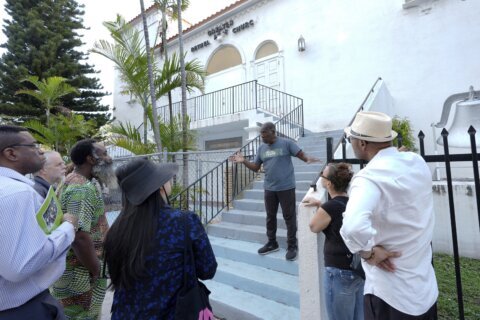RALEIGH, N.C. (AP) — After several months of speculation over who would fill the chancellorship at North Carolina’s flagship university, interim leader Lee Roberts has been picked to be the 13th chancellor of the University of North Carolina at Chapel Hill.
Roberts was approved Friday by the University of North Carolina Board of Governors. The announcement means the end of yet another highly anticipated chancellor search in the state’s public university system, which has filled four other vacancies in the past year.
UNC System President Peter Hans, who was charged with nominating a chancellor pick for the board to vote on, said UNC needs a “set of fresh eyes” to chart the university’s path forward during a turbulent time for higher education. He called Roberts “the right leader for this moment in Carolina’s history.”
“I have a deep respect for those who invite dissenting opinions and make a point of engaging with thoughtful critics, and Roberts has demonstrated that instinct time and again,” Hans said during the meeting.
Roberts was announced as interim chancellor in December after previously serving on the UNC Board of Governors since 2021. His experience has been primarily focused on finance, ranging from his position as the state budget director for former Republican Gov. Pat McCrory to the founder of an investment firm in Raleigh.
Roberts’ leadership at UNC was put on national display during tense campus protests against the war in Gaza, which resulted in several arrests. His actions — which included reraising the American flag taken down by demonstrators — were celebrated by Republican leaders such as Senate President Phil Berger and House Speaker Tim Moore, who publicly encouraged the university system to give him the UNC chancellorship.
“Nobody promised me anything. The process felt pretty rigorous from my standpoint as a participant in the process,” Roberts told reporters after his first public appearance following the vote.
Now, Roberts will continue to lead the university during a time of major adjustments, including navigating the ongoing upheaval of the university system’s former diversity policy. Among the priorities he mentioned for his first semester on the job was ensuring UNC excels in athletics and making progress on the School of Civic Life and Leadership.
The former chancellor, Kevin Guskiewicz, left his post in January to become president of Michigan State University. During his five-year tenure, Guskiewicz led the university through a tumultuous period — ranging from grappling with the COVID-19 pandemic to the very public dispute between the university’s board of trustees and Nikole Hannah-Jones, a prominent Black journalist who was denied tenure.
A search committee of 13 voting members formed in February to seek candidates for the role. Due to a systemwide policy, chancellor searches are kept mostly confidential. All candidate identities, including those of finalists, are not available to the general public and are not subject to public records.
Search committee meetings began to ramp up over the summer, with candidate interviews conducted last week. The UNC Board of Trustees approved no less than three finalists on Monday, which was sent to Hans for his selection.
One of the search committee’s major concerns during the search process was competing in what Laurie Wilder, head of search firm Parker Executive Search, called a “war for talent” in a July meeting. Almost half of the top public and private universities have conducted their own leadership searches in the last few years, she said, which resulted in a “very competitive national market.”
Committee leaders also lauded the diverse backgrounds of the candidates. Wilder said they had reached out to candidates who were provosts and research leaders, as well as those with corporate and military backgrounds.
“Not every great leader has gone through exactly the pipeline that maybe one would have thought 20, 30, 50 years ago. But we’re excited to have the variability to find the best leader to carry our university forward,” search committee chair Cristy Page told reporters in July.
Some candidates — particularly those with political backgrounds — have previously caused outcry on university campuses. In 2022, the University of Florida was met by significant pushback when it named a sitting Republican U.S. senator from Nebraska, Ben Sasse, as the sole presidential finalist.
Citing his wife’s health issues, Sasse recently resigned after spending less than two years in the position, which now sends Florida’s flagship university back into the presidential search process.
Copyright © 2024 The Associated Press. All rights reserved. This material may not be published, broadcast, written or redistributed.






